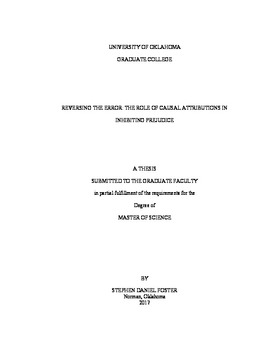| dc.contributor.advisor | Carvallo, Mauricio | |
| dc.contributor.author | Foster, Stephen | |
| dc.date.accessioned | 2017-05-10T14:06:08Z | |
| dc.date.available | 2017-05-10T14:06:08Z | |
| dc.date.issued | 2017-05 | |
| dc.identifier.uri | https://hdl.handle.net/11244/50739 | |
| dc.description.abstract | There are a wide variety of explanations for why a person may hold prejudicial attitudes. For example, prior research suggests that those who hold more prejudicial views partake in the fundamental attribution error in regard to outgroup members, attributing certain outcomes to dispositional as opposed to situational factors. The current study was designed to explore one mechanism through which low-prejudice individuals are able to inhibit prejudicial thoughts. Utilizing a sample of 271 undergraduates, we hypothesized that low-prejudice participants (i.e., scored low in symbolic racism) would make more situational attributions in comparison to dispositional attributions in a racially-charged police aggression scenario. Results of the study suggest that low-prejudice participants reverse the fundamental attribution error and tend to take situational factors into account. Furthermore, this reversal predicts less support for the police’s use of physical force in this scenario. Implications for the inhibition of prejudice are discussed. | en_US |
| dc.language | en_US | en_US |
| dc.subject | prejudice | en_US |
| dc.subject | inhibition | en_US |
| dc.subject | attributions | en_US |
| dc.subject | police aggression | en_US |
| dc.title | Reversing the Error: The Role of Causal Attributions in Inhibiting Prejudice | en_US |
| dc.contributor.committeeMember | Mayeux, Lara | |
| dc.contributor.committeeMember | Mendoza, Jorge | |
| dc.date.manuscript | 2017-05-01 | |
| dc.thesis.degree | Master of Science | en_US |
| ou.group | College of Arts and Sciences | en_US |
| shareok.orcid | 0000-0002-6014-4415 | en_US |
